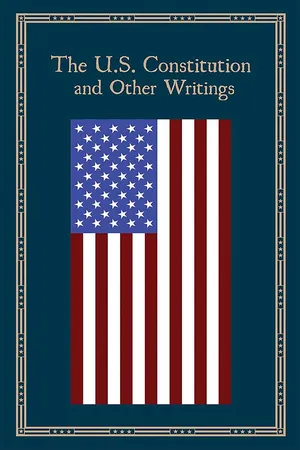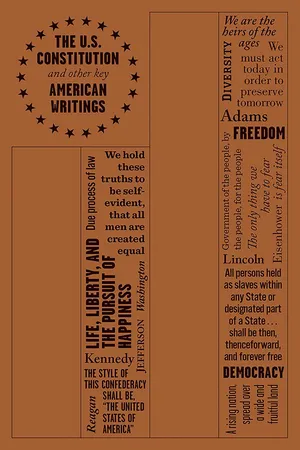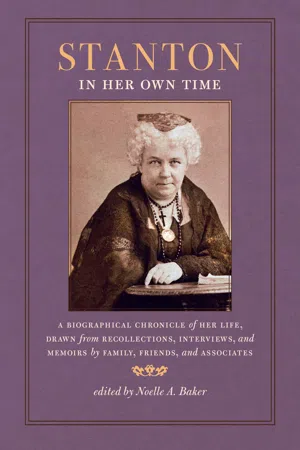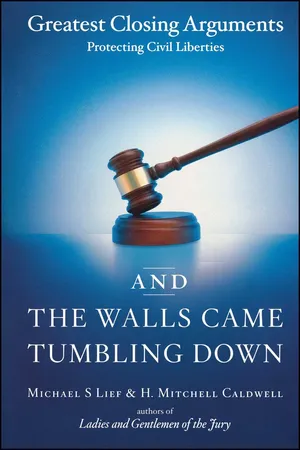Politics & International Relations
Susan B Anthony
Susan B. Anthony was a prominent American suffragist and social reformer who played a key role in the women's suffrage movement. She was a co-founder of the National Woman Suffrage Association and dedicated her life to advocating for women's right to vote. Anthony's tireless efforts and activism paved the way for the eventual passage of the 19th Amendment, granting women the right to vote in the United States.
Written by Perlego with AI-assistance
Related key terms
1 of 5
5 Key excerpts on "Susan B Anthony"
- eBook - PDF
Women Public Speakers in the United States, 1800-1925
A Bio-Critical Sourcebook
- Karlyn Kohrs Campbell(Author)
- 1993(Publication Date)
- Greenwood(Publisher)
SUSAN B. ANTHONY (1820-1906), radical egalitarian of woman's rights KATHLEEN L. BARRY Susan B. Anthony's public career as a spokeswoman for and leader of the woman's rights movement spanned fifty-six years—the entire second half of the nineteenth century into the early years of the twentieth. During that time, she witnessed small gains for women, such as slowly evolving access to higher education, and large losses, such as repeated defeats of constitutional amend- ments granting women suffrage. In the 1840s, her early career as a school teacher eventually led her into public speaking on temperance issues. In the early 1850s, she discovered her talent for arousing women to action in their own behalf as she built organizational structures from local societies to state and national as- sociations. She increased opportunities for women to speak in public by organ- izing national woman's rights conventions and petition campaigns throughout the 1850s, even after many women activists had returned to their family re- sponsibilities. By the time of her arrest in 1872 for voting, Anthony had gained recognition as the charismatic leader of efforts for woman's rights. By the 1880s, she had taken her campaigns to Europe and laid the foundation for an international movement. From then until her death in 1906, in both her organizing efforts and her lectures, her focus was on women's political power through suffrage. Recognized for giving her life to the cause of women's emancipation, by the turn of the century she had become the international spokesperson of woman's rights. BACKGROUND Nothing in Anthony's early life presaged her extraordinary and, for many of the early years, notorious public career as the leader of woman's rights. Her name would become synonymous with the cause. She retained a charismatic appeal because she came to be viewed as embodying the very liberation she fought for in behalf of women. - eBook - ePub
- (Author)
- 2017(Publication Date)
- Canterbury Classics(Publisher)
UFFRAGE (1873 )DELIVERED IN TWENTY-NINE OF THE POST OFFICE DISTRICTS OF MONROE, AND TWENTY-ONE OF ONTARIO, IN HER CANVASS OF THOSE COUNTIES, PRIOR TO HER TRIAL IN JUNE, 1873.In 1872 activist Susan B. Anthony cast an illegal vote in the presidential election. She was arrested and put on trial the next year, where she delivered a rousing speech about the injustice of the ban on women voting. Ultimately, Anthony was found guilty and fined $100, which she refused to pay. Throughout her life, she remained an advocate for many issues, including women’s suffrage. Susan B. Anthony died in 1906 … fourteen years before the U.S. government amended the Constitution to give women the right to vote.F riends and Fellow-citizens: I stand before you tonight, under indictment for the alleged crime of having voted at the last Presidential election, without having a lawful right to vote. It shall be my work this evening to prove to you that in thus voting, I not only committed no crime, but, instead, simply exercised my citizen’s right, guaranteed to me and all United States citizens by the National Constitution, beyond the power of any State to deny.Our democratic-republican government is based on the idea of the natural right of every individual member thereof to a voice and a vote in making and executing the laws. We assert the province of government to be to secure the people in the enjoyment of their unalienable rights. We throw to the winds the old dogma that governments can give rights. Before governments were organized, no one denies that each individual possessed the right to protect his own life, liberty and property. And when 100 or 1,000,000 people enter into a free government, they do not barter away their natural rights; they simply pledge themselves to protect each other in the enjoyment of them, through prescribed judicial and legislative tribunals. They agree to abandon the methods of brute force in the adjustment of their differences, and adopt those of civilization. - Founding Fathers(Author)
- 2015(Publication Date)
- Canterbury Classics(Publisher)
SUSAN B. ANTHONY ON WOMEN’SSUFFRAGE (1873) __________In 1872, activist Susan B. Anthony cast an illegal vote in the presidential election. She was arrested and put on trial the next year, where she delivered a rousing speech about the injustice of the ban on women voting. Ultimately, Anthony was found guilty and fined $100, which she refused to pay. Throughout her life, she remained an advocate for many issues, including women’s suffrage. Susan B. Anthony died in 1906 … fourteen years before the U.S. government amended the Constitution to give women the right to vote.DELIVERED IN TWENTY-NINE OF THE POSTOFFICE DISTRICTS OF MONROE, AND TWENTY-ONE OF ONTARIO, IN HER CANVASS OF THOSECOUNTIES, PRIOR TO HER TRIAL IN JUNE, 1873.
F riends and Fellow-citizens: I stand before you tonight, under indictment for the alleged crime of having voted at the last Presidential election, without having a lawful right to vote. It shall be my work this evening to prove to you that in thus voting, I not only committed no crime, but, instead, simply exercised my citizen’s right, guaranteed to me and all United States citizens by the National Constitution, beyond the power of any State to deny.Our democratic-republican government is based on the idea of the natural right of every individual member thereof to a voice and a vote in making and executing the laws. We assert the province of government to be to secure the people in the enjoyment of their unalienable rights. We throw to the winds the old dogma that governments can give rights. Before governments were organized, no one denies that each individual possessed the right to protect his own life, liberty and property. And when 100 or 1,000,000 people enter into a free government, they do not barter away their natural rights; they simply pledge themselves to protect each other in the enjoyment of them, through prescribed judicial and legislative tribunals. They agree to abandon the methods of brute force in the adjustment of their differences, and adopt those of civilization.- eBook - PDF
Stanton in Her Own Time
A Biographical Chronicle of Her Life, Drawn from Recollections, Interviews, and Memoirs by Family, Friends, and Associates
- Noelle A. Baker(Author)
- 2016(Publication Date)
- University Of Iowa Press(Publisher)
Anthony story. In this admiring reminiscence of Stanton’s com-manding legal mind, authorial power, and captivating oratorical presenta-tion, Harper emphasizes that Anthony’s role in propelling Stanton’s “world-wide fame” is incalculable. Stanton and Susan B. Anthony (1885–1915) [125] From “As a Mother,” Margaret Stanton Lawrence, 1885 6 Editor New Era : Your letter was read aloud to us, in which you said that you intended to devote the November number of your New Era to my mother, in honor of her seventieth birthday; and that you desired to have a pen picture of our family life, and I, being the only child at home, was thereupon delegated to be the special artist for the work. As my mother could not set forth in glowing colors her own domestic virtues, and as Miss Anthony, who is a part of our household, is now in the agonies of Vol. III. of The History of Woman Suffrage , buried under mountains of illegible manuscripts, I, with much hesitancy, undertake the task. . . . But to return to my picture of mother and Susan. They are busy all day and far into the night on said Volume III. As our house faces the south the sunshine streams in all day. In the centre of a large room, 20 by 22, with an immense bay window, hard wood floor and open fire, beside a substantial offi ce desk with innumerable drawers and doors, filled with documents, — there vis-à-vis sit our historians, surrounded with manuscripts and let-ters from Maine to Louisiana. In one drawer are engravings of some of the leading advocates, fifteen in number, all waiting to take their places in this last volume. Entre nous , I am fearfully tired of this History. It has stood in the way of everything we have wanted mother to do for the last seven years. We all feel towards these volumes as a family of children would to some fa-vorite adopted child, that filled their places in a mother’s heart. - eBook - ePub
And the Walls Came Tumbling Down
Greatest Closing Arguments Protecting Civil Libertie
- Michael S Lief, H. Mitchell Caldwell(Authors)
- 2006(Publication Date)
- Scribner(Publisher)
By 1900, Susan B. Anthony, now the icon of the women’s movement, was an old woman. Despite her age and failing health, she traveled each year to Washington, D.C., for NAWSA’s annual meeting. She made her last yearly trek to the capital in 1902, at the age of eighty-two.At Elizabeth Cady Stanton’s funeral that year, a photograph of Anthony rested on the casket. Discussing her dear friend’s death, Anthony said, “The voice is hushed that I have longed to hear for fifty years.”Anthony’s final public appearance was in Washington, D.C., on February 15, 1906. Her fiery demeanor dimmed by the toll of the sixty-year struggle, she symbolically passed the torch to the next generation of suffragists, declaring they must persevere and succeed, because “failure is impossible!” Anthony wanted the women’s cause—and not its leader—to be the focus of national attention. Knowing her death was imminent, she instructed mourners months before that “when it is a funeral, remember that there should be no tears. Pass on, and go on with the work.” She died March 13 at her home in Rochester, New York, ten thousand people turning out to mourn the loss of their champion.Six years later, ex-president Theodore Roosevelt’s Bull Moose Party became the first national political party to support women’s suffrage, but it wasn’t until 1920—one hundred years after Anthony was born and forty-two years after its introduction—that the Nineteenth Amendment to the Constitution was ratified by the states. Women finally had the vote.Susan B. Anthony’s life, her unflagging determination, and her trial brought a woman’s right to vote to the forefront of American political discourse, radically and permanently altering the rights and status of women in American society. Almost fifty years after her trial, fourteen years after her death, and some 130 years after the Constitution was ratified, the Nineteenth Amendment finally secured for women the right to vote.
Index pages curate the most relevant extracts from our library of academic textbooks. They’ve been created using an in-house natural language model (NLM), each adding context and meaning to key research topics.




